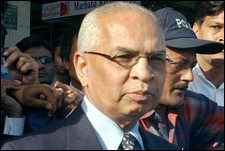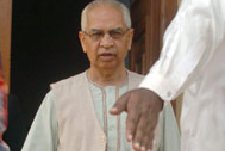Adil Najam
The swearing in of Justice Rana Bhagwandas as the Acting Chief Justice (ACJ) of Pakistan is not a ‘historical’ event in and of itself. However, Justice Bhagwandas now has a historical opportunity before him to influence the both the history of the institution he represents (the Judiciary) as well as the history of the country.


First some points of context:
- This is NOT the first time that Justice Bhagwandas has been the Acting Chief Justice. Indeed, as the next most senior judge on the Supreme Court, he has been called on to take this role before. Regular readers of ATP would remember seeing his picture here back in January in relation to a decision on Basant that he had then given, also as ACJ.
- Remember that he is the ‘Acting’ Chief Justice; the assumption and the point of fact being that Justice Iftikhar Chaudhry is still the Chief Justice.
- Even if he were to be appointed the Chief Justice eventually, he would not be the first non-Muslim Chief Justice of Pakistan. In fact, Justice Alvin Robert (A.R.) Cornelius served on the Supreme Court of Pakistan for 17 years, nearly 8 years of those as Chief Justice. Indeed, he is widely regarded as amongst the most respected and well-known Pakistanis to have held that office.
Indeed, it is a little disconcerting that his taking over this office – which was the procedurally appropriate thing to be done – is raising such attention. It is doing so, partly, on the assumption that the appointment of Justice Javed Iqbal as ACJ before him had some sinister purpose. Largely, it is because most Pakistanis have only just realized that Justice Bhagwandas is a practicing Hindu, and there are clearly those who want to make this an issue, even questioning his appropriateness for that reason. It is also, I think, that people’s faith in the judicial process is so low that they assume that he will soon, necessarily, assume the office of the Chief Justice. (It should be added that he is slated to retire at the age of 65, which happens this December; Justcie Iftikhar, on the other hand, does not retire till 2013).
Justice Rana Bhagwandas is – as, in fact, was Justice Javed Iqbal before him – considered to be a highly respected judge of high intellectual caliber and personal integrity. Born in 1942, Justce Bhagwandas became a lawyer like many other educated Sindhi Hindus and also has a post-graduate degree in Islamic studies and is considered an expert on constitutional law. He was a practising lawyer for about two years before being appointed to the bench in July 1967; he became a judge of the Sindh High Court in 1994; and of the Supreme Court in 2000. A challenge to his appointment to the higher judiciary on the grounds that he was a non-Muslim was dismissed by the Sindh High Court in 2002.
It is (a) because the prescribed procedure was followed here in his appointment, and (b) because he is a highly respected judge and a constitutional expert, that one should focus on this appointment. He is obviously aware of the historical decisions ahead of him. His first statement after taking his oath could be misconstrued as over-enthusiastic but one would like to believe that there is no hidden message in this statement and he is merely being diplomatic. According to The News:
Acting Chief Justice of Pakistan (ACJP), Rana Bhagwan Das has said that the presidential reference against Justice Iftikhar Chaudhry would be dealt with adequately. Talking to the media after taking oath as ACJP, Justice Bhagwan Das told that the Supreme Judicial Council would be taking a decision on the issue of holding the hearing of the reference in open or in camera. He said that the judiciary would not disappoint the people and the nation would soon hear the good news.
The history of the Pakistan Supreme Court and of Justices in this situation is a ‘busy’ one. Too busy, in my opinion. But it is not an even one. There have been shameful examples when the courts have allowed themselves to become tools in the hands of military and political leaders; but there have also been times when the Justices have made the nation proud by standing up to all pressures and deciding solely on the merit of the cases.
Judges, of course, love to hear about precedent. Here, the precedence lies in both direction. The question is, which precedent will Justice Rana Bhagwandas follow?
For anyone interested in the history of the Judiciary in such cases – both good and bad – do watch this very informative BBC report on the subject.
http://youtube.com/watch?v=_gE39xhnm0w




















































Justice Bhagwan Das and othere members of JC will be remembered in the history. It depends on them with whom.. Justice Munir, Justice Irshad Hasan or with Justice Durab Patel ,Justice Saeed uz Zaman Siddiqui.
Its a chance for judiciary to dignify itself.
Interesting development. I think if he had refused to take oath then things would have been worse and everyone would have said that the government pressured him to do so b/c they wanted Javed Iqbal to stay or under pressure from the MMA.
By the way, on the pictures, what is the first one of. The second is Javed Iqbal taking oaath and third is Bhagwandas taking oath?
ACJ Bhagwan Daas has a reputation of a man of honesty and integrity throughout his judicial career. He is considered a man of books who hardly attends social gatherings.
But there is not a single bold judgment by him since he in the apex court. Rather he is one of the signatories of ‘Doctrine of Necessity’.
I pray this time he will come up with a historical verdict which may bring him into the camp of good judges as shown in the BBC documentary.
This is a tricky one. Apparently his taking oath even as ‘acting’ CJ is not constitutional/legal as CJ is present and able to do his service and only held from service through an illegally act from General Musharraf. I was hoping that Baghwan Das would not take the oath as it reflects on his credibility in terms of consideration for law and constitution.
“the nation would soon hear the good newsâ€
So far I have the impression that Justice Bhagwandas is a man of intergrity. Maybe that is the reason this Govt tried to bypass him. I sincerely wish that ACJP buries the cursed ‘Nazria e Zaroorat’ (theory of necessity) for good.
I hope he does not dissapoint us this time around.